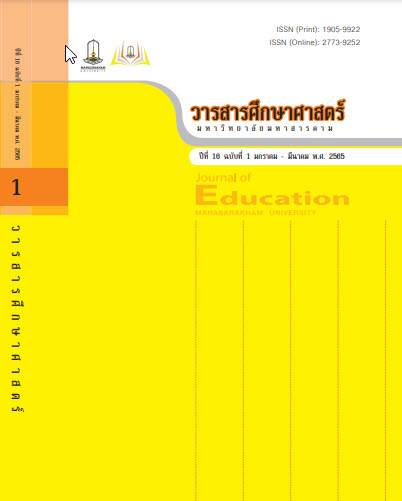Development Problem-based Approach to promote Scientific Communication and Collaboration Skills in Concept of Living Things of Grade 5 Students
Main Article Content
Abstract
This research aimed to 1) study learning management approaches and 2) development problem-based approach to promote scientific communication and collaboration skills in concept of living things of grade 5 students. There is a 6-step problem-based learning model, these are: step 1: Identify the problem, step 2: understanding the problem, step 3: conducting research, step 4: knowledge synthesis, step 5: summarize and evaluate the answer, and step 6: presentation and evaluation. The participants in the research were 12 students from grade 5 students in an elementary school in Sukhothai Province and purposive selection. The research instruments included a set of lesson plans, learning sheets, and reflective journals. Content analysis and data creditability by method triangulation were used to identify the findings. The research results found that: 1) learning management should choose a problem situation close to the students in daily life, an example should be given in connection with the situation received and in accordance with the experience of the learners, and 2) scientific communication and collaboration skills were more development in every operating cycle.
Downloads
Article Details

This work is licensed under a Creative Commons Attribution-NonCommercial-NoDerivatives 4.0 International License.
References
เจษฎายุทธ ไกรกลาง. (2560). การจัดการเรียนรู้โดยใช้รูปแบบปัญหาเป็นฐานต่อการส่งเสริมผล สัมฤทธิ์ทางการเรียนและความสามารถในการคิดแก้ปัญหาทางวิทยาศาสตร์ของนักเรียนชั้น มัธยมศึกษาปีที่ 3. วิทยานิพนธ์ ค.ม., มหาวิทยาลัยราชภัฏมหาสารคาม. มหาสารคาม.
ณชานันท์ ประเสริฐสุข. (2559). การพัฒนาการจัดการเรียนรู้โดยใช้ปัญหาเป็นฐานเพื่อส่งเสริมการ คิดอย่างมีวิจารณญาณ สำาหรับนักเรียนชั้นมัธยมศึกษาตอนปลาย. วิทยานิพนธ์ กศ.ม.. มหาวิทยาลัยนเรศวร. พิษณุโลก.
พจงจิตร นาบุญมี. (2559). การจัดการเรียนรู้โดยใช้ปัญหาเป็นฐานเพื่อพัฒนาสมรรถนะการแก้ปัญหา แบบร่วมมือ เรื่อง การเคลื่อนที่แบบหมุนของนักเรียนชั้นมัธยมศึกษาปีที่ 4. วิทยานิพนธ์ กศ.ม.. มหาวิทยาลัยนเรศวร. พิษณุโลก. มังกร ทองสุขดี. (2557). การสอนวิทยาศาสตร์ในชั้นประถมศึกษา. พิมพ์ครั้งที่ 4. กรุงเทพฯ: จุฬาลงกรณ์ มหาวิทยาลัย.
สาริญา และสุม. (2560). ผลของการจัดการเรียนรู้โดยใช้ปัญหาเป็นฐาน ที่มีต่อผลสัมฤทธิ์ทางการเรียน วิชาชีววิทยา ทักษะการสื่อสารทางวิทยาศาสตร์และเจตคติต่อวิทยาศาสตร์ของนักเรียน ชั้นมัธยมศึกษาปีที่ 6. วิทยานิพนธ์ ศษ.ม., มหาวิทยาลัยสงขลานครินทร์. สงขลา.
สำนักงานเลขาธิการสภาการศึกษา. (2550). แนวทางการจัดการเรียนรู้ที่เน้นผู้เรียนเป็นสำาคัญ: การ จัดการเรียนรู้โดยใช้ปัญหาเป็นฐาน. กรุงเทพฯ: โรงพิมพ์ชุมนุมสหกรณ์การเกษตรแห่ง ประเทศไทย จำากัด.
สุวิชา ศรีมงคล. (2557). การส่งเสริมทักษะการเรียนรู้ในศตวรรษที่ 21: ทักษะการสื่อสารและความ ร่วมมือในชั้นเรียนวิทยาศาสตร์ เรื่องเซลล์และองค์ประกอบของเซลล์ด้วยสถานการณ์จำาลอง. วิทยานิพนธ์ ศษ.ม., มหาวิทยาลัยขอนแก่น. ขอนแก่น.
อิทธิศักด์ิ ศิริจันทร์. (2562). ทักษะการสื่อสารของผู ้บริหารสถานศึกษาในศตวรรษที่ 21. วารสารวิชาการ มหาวิทยาลัยราชภัฏศรีสะเกษ, 13(1), 139. Kemmis, S &
McTaggart, R. (1988). The action research planner. (3rd ed.). Victoria: Deakin University.
Knowles, S. M. (1975). Self-directed learning: A guide for learners and teachers. New York: Follett. The Partnership for 21st Century Skills. (2007). Framework definition. Retrieved July 28, 2020, from http://www.p21.org/documents/P21-Framework-Definitions.pdf


